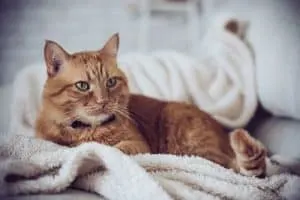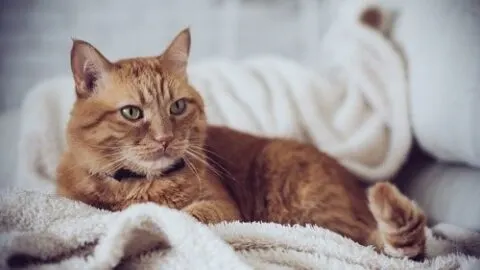 If you’ve ever had a cat that’s a blanket licker, you’ll be very familiar with this adorable (and occasionally worrisome) behavior. The good news is that blanket licking is a prevalent behavior in cats, so you don’t need to be too concerned if your cat reaches for a blanket once in a while. Of course, like just about everything our feline friends do, it’s understandable to want to know, why do cats lick blankets?
If you’ve ever had a cat that’s a blanket licker, you’ll be very familiar with this adorable (and occasionally worrisome) behavior. The good news is that blanket licking is a prevalent behavior in cats, so you don’t need to be too concerned if your cat reaches for a blanket once in a while. Of course, like just about everything our feline friends do, it’s understandable to want to know, why do cats lick blankets?
Cats lick blankets because it is satisfying and comforting for them. Blanket licking can be a sign that your cat is comfortable or that they are stressed. Cats who have Pica also lick blankets.
Sounds complicated, right? Don’t worry; we’ll go into the most common reasons for blanket licking in this article, including some tips for managing blanket licking and telling the difference between a happy blanket licker and a blanket licker that needs a little extra attention and support.
5 Reasons Cats Lick Blankets
Blanket licking is really common among cats, however, there are a few key reasons why they do it.
Blanket Licking Is Relaxing and Comforting To Cats
One of the main reasons experts think cats lick and nurse on blankets is because it’s comforting. The texture of different fabrics may remind them of nursing when they were kittens or grooming and cuddling with their littermates.
Your Cat Might Have Been Separated From Their Mother Too Early
This behavior is also thought to be slightly more common among cats who were separated from their mothers too early. These cats likely have a stronger nursing drive than average because of that separation, but it doesn’t necessarily mean that licking and nursing blankets are a terrible thing for them. It just may be more comforting than usual.
Your Cat Trusts You
Licking blankets, especially if they bite them and knead their paws like they are nursing, leaves your cat more vulnerable than usual. If they perform this behavior sitting on your lap or next to you, chances are they trust you a lot. Your cat is telling you that they know you’ll keep them safe, or at least warn them if there is trouble coming.
Your Cat Might Have Pica
Unfortunately, there are times when blanket licking can be more concerning. One of them is if your cat tends to bite and eat everything in sight. In that case, you may want to talk to your vet about the possibility that your cat has Pica.
Pica is an eating disorder that people get as well as cats. It means that your cat tends to eat everything, including things that are very much inedible. It can be a severe risk of severe cases, so it’s best to talk to your vet for tips on managing it. They may even recommend treatments to help reduce your cat’s tendency to eat non-food items.
Stress Is Impacting Your Cats Behavior
Another common reason for blanket licking can be stress, particularly prolonged stress. Basically, in this instance, your cat is trying to self-soothe to feel better about the situation, which might explain your cat’s blanket licking if they seem to do it more when they are upset or in new situations.
It’s a little like purring, which can be a sign of contentment or stress/pain. Cats reach for the same kinds of behaviors they use when they feel good as a coping mechanism when they feel bad.
Is It Normal For Cats To Lick Blankets
Yes, it’s very normal for cats to lick and even suck on blankets. It’s especially common for your cat to have a favorite blanket that they prefer for this behavior or for them to develop a favorite type of fabric.
Not all cats will lick blankets, but it isn’t too concerning if your cat does it from time to time.
Some cats, particularly Persians and Oriental Shorthairs, are more prone to blanket licking than others.
What isn’t normal is getting obsessive about blanket licking. If your cat is continuously licking blankets or refuses to stop, then you might be dealing with more concerning behavior.
What Does It Mean When Cats Lick Blankets
It can mean a wide range of things when your cat licks blankets. Most of the time, it’s an expression of trust or comfort in the situation. Your cat feels good, so they’re behaving more like a kitten and showing that they trust that they are safe.
Unfortunately, this behavior can also mean your cat is stressed or scared and that they are trying to self-soothe.
In some cases, obsessive blanket licking can be a sign of feline pica or indicate that your cat isn’t getting the nutrition they need from their diet. In the case of diet deficiencies, it’s thought that blanket licking is an attempt to nurse as an alternate source of nutrition.
Of course, blankets aren’t very nutritious. So, if your cat starts blanket licking and is losing weight at the same time, it’s probably time for a vet trip to make sure they’re getting what they need from their diet.
Why Won’t My Cat Stop Licking My Blanket
There are a few reasons your cat might refuse to stop licking a blanket. For one thing, it may be their favorite blanket for that behavior; they might think that it’s their blanket. However, if your cat is performing this behavior more often than usual, refuses to stop, or is starting to pull out pieces of fabric or threads from the blanket, then you might be dealing with a stressed cat or pica.
If your cat seems to be getting obsessive, it’s likely time to call the vet or make an appointment.
Why Does My Cat Lick Fabric
Fabric licking, like blanket licking, is usually a sign of contentment and leftover nursing behavior in your adult cat. However, just like blanket licking, it’s essential to pay attention to your cat to ensure the behavior is innocent and not a symptom of some more significant problem.
Thankfully, since this is essentially the same behavior, the warning signs are the same. Rapidly losing or gaining weight, obsessive licking that’s hard to stop or redirect, and licking/chewing the results in swallowed threads or bits of fabric are all signs that something is wrong.
How To Stop Your Cat From Licking Blankets
There are a few options to stop your cat from licking blankets, but of course, the most crucial solution is getting to the source of the behavior. Here are some ideas to help you get started:
- Reduce Your Cat’s Stress: Try paying more attention to your cat (if they are a friendly social cat), increasing the number of toys they have available, or giving your cat a break from other pets and people to see if that helps reduce blanket licking behaviors.
- Change or Improve Your Cat’s Diet: Consult with a vet on diet options that will work for your cat’s age and weight. Consider adding wet food if your cat mostly eats kibble. If that doesn’t work, consider allergy and food sensitivity testing to see if your cat has special dietary needs.
- Use Mild Detergent on Your Blankets: If your cat is going after specific blankets, you don’t want them to consider spraying a mild non-toxic detergent on the blanket. Chances are the taste will be enough to stop the behavior. Just make sure it’s pet-safe and in a scent that doesn’t irritate you!
- Use Anti–Lick Sprays: Another good solution is anti-lick spray or drops designed to discourage licking/clawing behavior. Just remember that not all pet-products are actually safe, so you should look for a reputable brand or consult with a vet for good cat-safe options.
Things To Consider
It’s important to remember that changing behavior in your cat is often more of a negotiation than actual training. Cats don’t usually respond very well to negative reinforcement, and just taking away their favorite blankets likely isn’t a long-term solution.
Yelling at your cat or using other techniques to prevent the behavior isn’t very effective either. Yelling is likely to increase your cat’s stress so that it might increase their blanket licking tendencies.
Instead, try to figure out why your cat is blanket licking and how you can change their environment to be more supportive, enjoyable, or healthy.
It’s also important to remember that some cats may constantly lick blankets and fabric, even if you don’t want them to. If you suspect your cat is one of those, consider giving them their blanket or fabric in a pre-approved location so they have somewhere to express this behavior safely and without irritating you. Monitor the blanket to make sure it stays safe, wash it occasionally, and discourage blanket licking anywhere else with a combination of the techniques we listed above.
If you think blanket licking is a sign of affection and trust from your cat, but it isn’t very pleasant and one you don’t appreciate, that’s okay! Just try to redirect your cat toward other signs of affection that are easier for you to deal with. A cat that loves blanket licking might like being brushed, or cuddled, or playing with a favorite toy just as much as long as you’re interacting with them.
It’s also important to remember that sometimes you can’t solve all your cat’s problems independently. If your cat is dealing with pica or high-stress levels, it isn’t necessarily a reflection of your skill as a cat owner, how much you love them, or the quality of their environment.
Some cats are just naturally higher-stress animals.
In those cases, reaching out to a vet for help is not only the right thing to do for your cat, but it’s also the right thing to do for you. Please don’t be ashamed of asking for help taking care of your pet; it’s okay.

My name is James, and welcome to FAQCats!
Along with our team of cat owners, expert pet enthusiasts, and pet professionals, we aim to write engaging helpful, engaging content about cats. At FAQCats we strive to provide content that’s accurate and fun to read. Our team writes about everything related to cats; even the most complex of topics. Through extensive research and caring for our own fur-pals, we’re able to provide something cat owners worldwide will love. Have a look around, and leave us feedback anytime!

